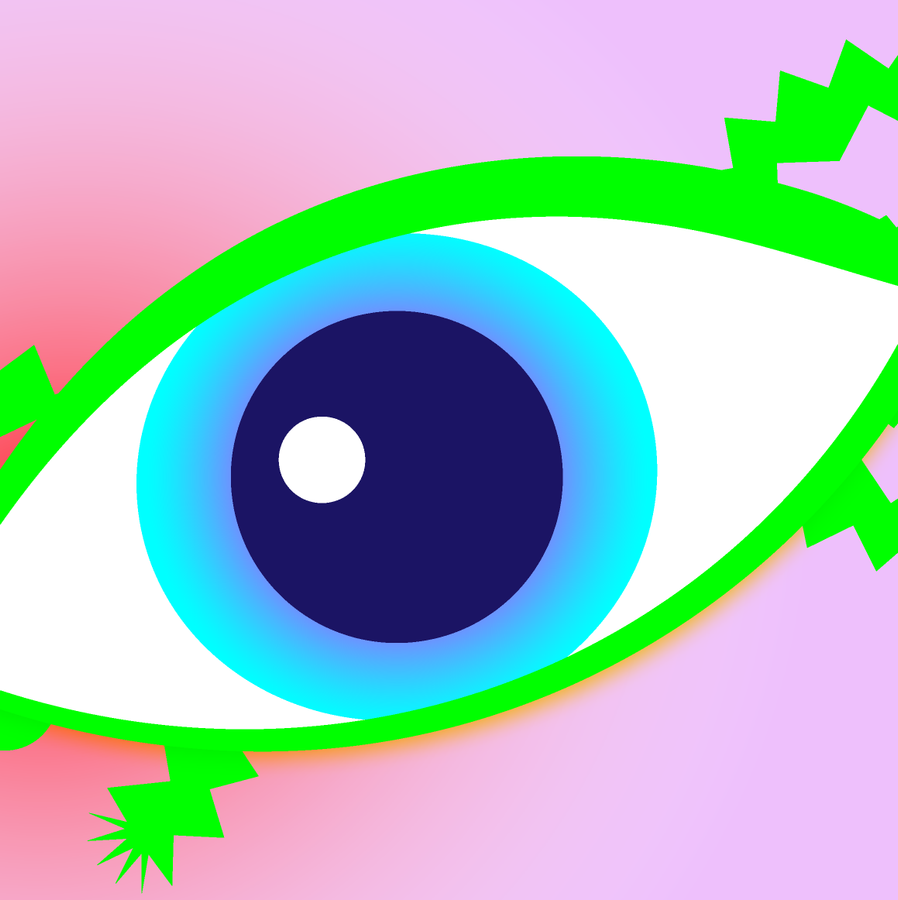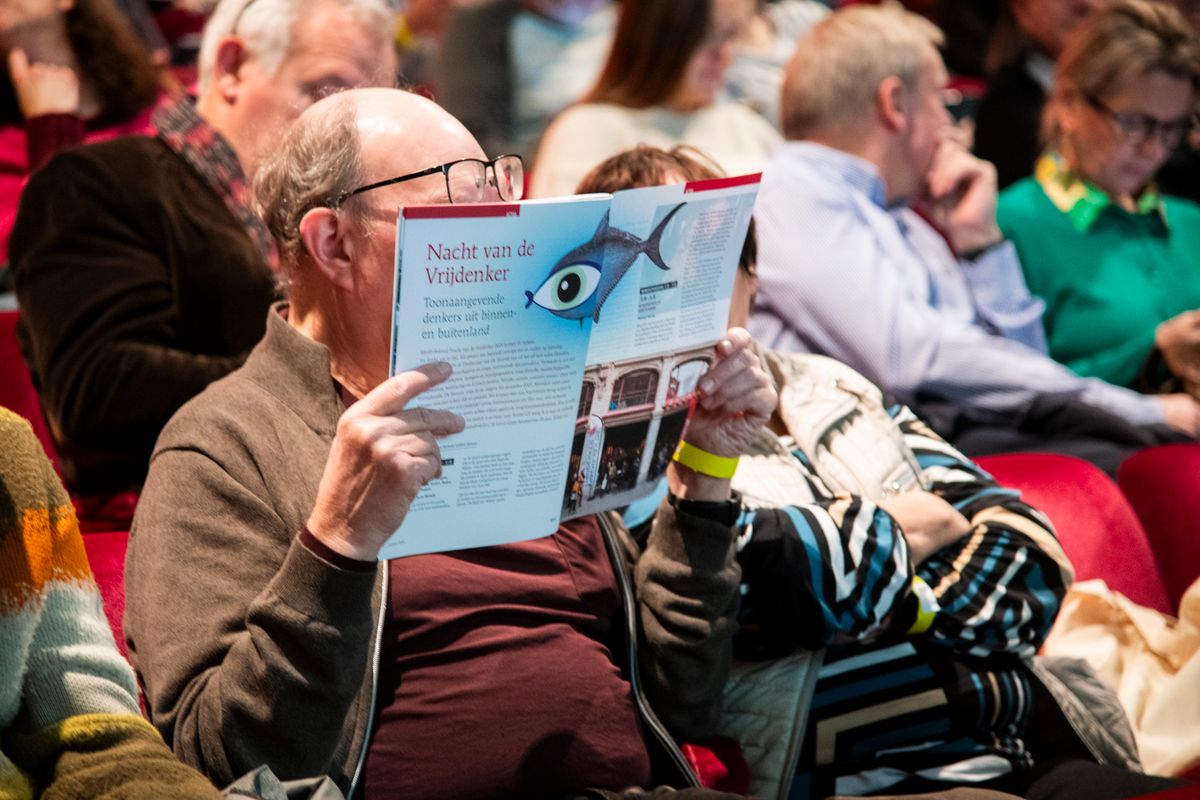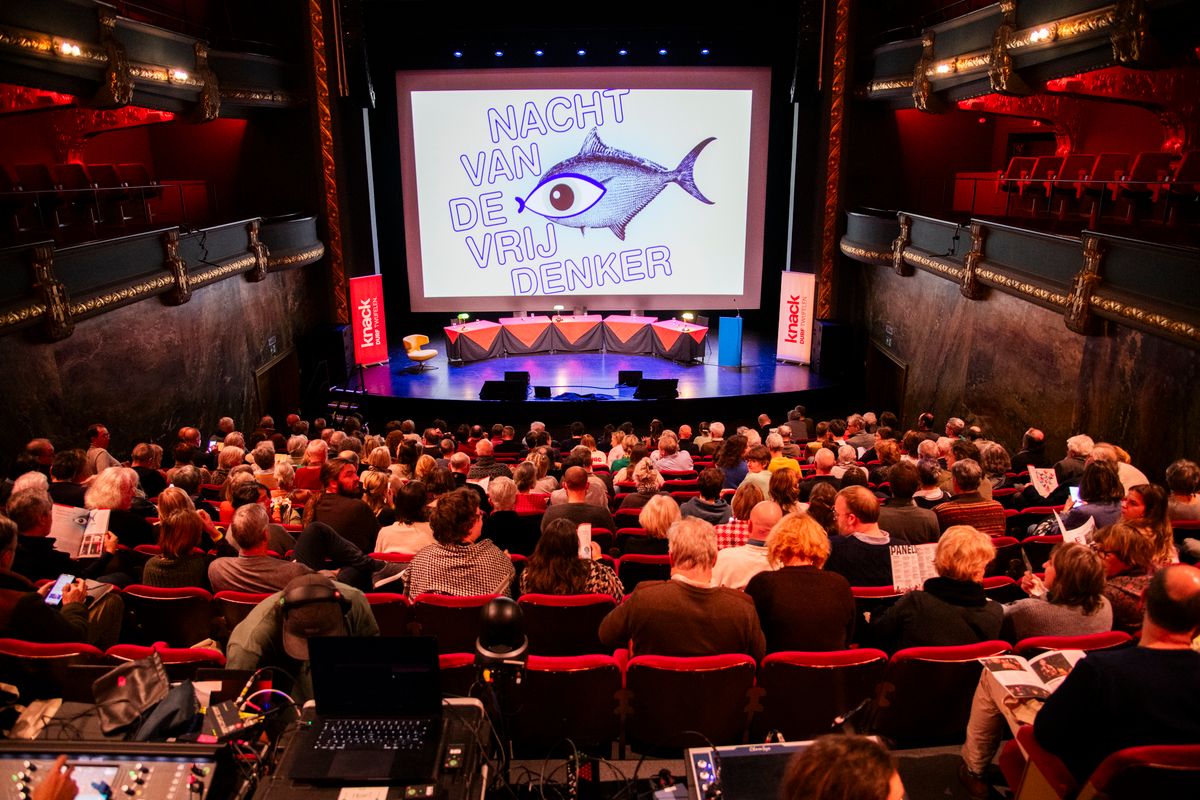
Nacht van de Vrijdenker 2025
-
Sat 22.1111:00 - 23:00De Vooruit, GentTHEATERZAAL
The annual ideas festival Nacht van de Vrijdenker once again fills the Theater Hall with wise philosophers, groundbreaking scientists, and young, refreshing opinion makers around questions that matter. What keeps you awake and alert? What do you have no control over, nor awareness of? What do you dig into that explains a lot? What unspoken hope is on the tip of your tongue?
Expect a marathon of debates, lectures, and panel discussions on philosophy, social issues, science, and critical thinking by speakers from both home and abroad. The Night of the Free Thinker brings a whirlwind of insights and ideas that open new perspectives and provide depth at the cutting edge. To understand what is troubling and to challenge what is established.
PROGRAMME
Border Colonialism: The Meaning and Nonsense of Borders
A world without borders. That is the premise of Albina Fetahaj's book 'Border Colonialism' and the starting point of this panel discussion, moderated by Dalilla Hermans. Together with Koen Bogaert, Fetahaj explores how borders function as instruments of power intertwined with capitalism, colonialism, and imperialism that exclude, dehumanize, and create inequality.
But do borders have no purpose at all? That is one of the central questions we will discuss in this panel. We weigh the meaning of borders – such as safety, economy, and identity – against the nonsense: their arbitrary and artificial nature, which leads to an us-versus-them mentality and deep inequality. Can we move towards a borderless world? Are there alternatives to rethink borders?
With an open mind, we invite you to reflect on how borders function, for whom and what they serve, and how we can contribute to rethinking our world.
Panel Discussion | AI and Being Human
The role of AI in our lives is growing exponentially, from healthcare to our way of working. But as the line between the natural and the artificial increasingly blurs, what does it mean to be human?
Naomi Jacobs' research on vulnerability and technology design reveals how AI can reinforce existing inequalities. Are certain groups at risk of being marginalized by systems that are not designed for values we consider important as a society – such as diversity, justice, and inclusion?
In this debate, Jacobs and moral philosopher Katleen Gabriels will discuss how we can preserve the humane in a world where the boundary between human and machine fades away.
What moral decisions are we willing to leave to algorithms? Is it ethical to use AI if it is ecologically unsustainable or undermines our critical thinking abilities?
And how does our symbiotic relationship with AI change our thoughts, behaviors, and feelings?
Panel Discussion | Opportunity or Crisis? The Reshaping of Democracy
Democracy is more than a form of governance; it is a promise. A promise of freedom, equality, and the ability to shape our future together. But what if that promise is under pressure?
How do we assess the impact of disinformation and the increased presence of defense? Is the welfare society wobbling? And what will the West look like in 2030?
During Night of the Free Thinker, four critical thinkers will reflect on the state of democracy in the West and the path we must take in the coming years. Ico Maly, Jan Balliauw, Michelle Haas, and Anton Jäger will share their visions and engage in conversation. Under the guidance of moderator Benedikte Coussement, they will explore the geopolitical and socio-economic shifts that are shaking democracy.
Which foundations of democracy must we safeguard, when does flexibility become necessary, and what must be fundamentally redefined? Discover this and think along at the opening debate of the Night of the Free Thinker.
Panel Discussion | Everything Changes... and Gets Better?
Every seventy years, the world stands at a tipping point, and surprise, we are right in the middle of it now. Economist Koen Schoors ventures into an optimistic worldview in his latest book, everything changes and gets better. Innovations such as digitalization, AI, and a circular economy will lead to a more sustainable and prosperous future.
But who reaps the benefits? At the Night of the Free Thinker, Schoors will engage in conversation with Sibo Kanobana, an expert in postcolonial studies. We pose them the crucial question: 'Everything gets better, but for whom and at whose expense?'
Can a capitalist system, historically built on inequality and racism, lead to a fair future? Can a 'green' economy thrive without exploiting countries and communities? And is deglobalization, as Schoors envisions, not just a new form of neocolonialism?
Discover how these two thinkers, each with their own vision of systemic change, challenge each other in a panel discussion about the future of our society.
Julian Baggini | Thinking Can Be Learned
Daily, our minds become overheated by tons of information stimuli, fake news, and noise. How do we distinguish facts from fiction? The essential from the trivial?
In his book 'How to Think like a Philosopher', philosopher Julian Baggini returns to the study of 'good reasoning' to find answers to these questions. He is guided by the greatest philosophers of the past and present.
Baggini illustrates with relatable examples that good thinking is not about intelligence, but about the attitude you adopt: sincerity, a meticulous pursuit of accuracy, and the patience to take the time for a well-considered conclusion. Good thinking is as much an ethical issue as it is a logical one.
Do not expect clever cognitive tricks to show off later at the café. Baggini invites you to develop better thinking habits, something our world needs more than ever.
Peter Venmans | Frivolity in a Serious Time
In a time of climate anxiety and threats of war, we are repeatedly called to be serious. To take our responsibility, because the situation is concerning.
Yet a certain dose of frivolity or cheerful innocence is very important right now. Essayist and philosopher Peter Venmans does not advocate for reckless frivolity or superficiality but for playfulness, irony, and a display of lightness (the Italian sprezzatura) in a time often overwhelmed by a spirit of seriousness, utility, and moral outrage.
Frivolity is a form of freedom and small happiness: the ability to approach weighty matters with a certain lightness, without denying them. We seriously need frivolity.
Jenny Kleeman | The Price of a Life
Life is priceless! Is that true? What is a human life actually worth, and who decides that?
In her book 'The Price of Life', British journalist Jenny Kleeman examines how decision-makers put a price tag on the priceless. Philanthropists, judges, insurers, healthcare providers, and ministers determine day in and day out the cost of saving, creating, or compensating for a life.
What does it mean for our humanity if we decide who receives expensive life-saving medications and who does not based on a cost-benefit analysis? How can it be that the cost of a new life, IVF treatment, is similar to ending a life, hiring a hitman?
What do we gain by leaving these profound decisions to cold, hard logic? Does this lead to a fairer, more transparent decision-making process? Or are we heading towards a moral bankruptcy, where the human aspect is lost sight of?
During this talk, you will discover with Kleeman the uncomfortable truth behind seemingly rational numbers.
New! Trefpunt and Nacht van de Vrijdenker are organising two Vrijdenker evenings on October 9 and 23 as a teaser for the Nacht van de Vrijdenker. Intimate free havens for grand ideas.
Keep an eye on www.nachtvandevrijdenker.be for news and updates.
Credits
An organisation of Geuzenhuis and huisvandeMens in collaboration with VIERNULVIER, Knack, and bookstore Walry with the support of mens.nu, imd, Cultuur Gent, and the City of Ghent, and supported by hujo, 't zal wel gaan, Willemsfonds, Vermeylenfonds, and the Humanist Association.




